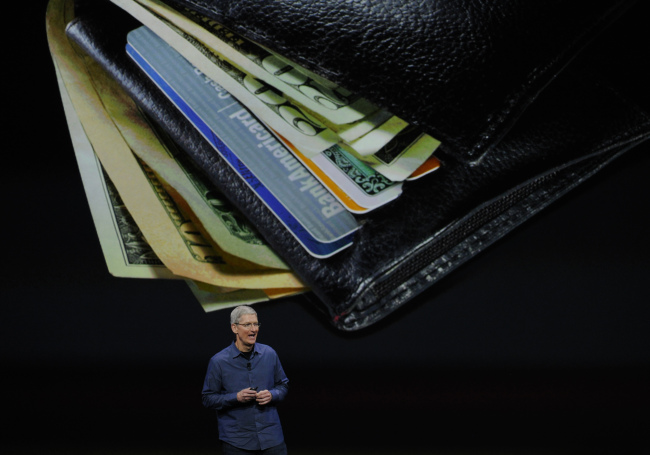Apple Inc.’s bid to replace the consumer wallet with its mobile payment system ran into a roadblock as CVS Health Corp. and Rite Aid Corp. disabled the technology in their drugstores.
CVS and Rite Aid are among 220,000 U.S. merchants that already have technology in place to read the short-range wireless signals that enable customers of Apple Pay or similar services to make a purchase by waving their smartphones. The retailers weren’t among those specifically named as accepting Apple Pay when the iPhone maker revealed its system last month.
The drug retailers, which are part of a consortium developing a competing payment system, stopped Apple Pay last week, said a person familiar with the situation who asked not to be named. The website MacRumors.com earlier reported that the stores disabled so-called contactless payment systems, and Slashgear.com published a purported internal memo in which Rite Aid says it is instead focusing on the consortium’s system.
CVS and Rite Aid are among 220,000 U.S. merchants that already have technology in place to read the short-range wireless signals that enable customers of Apple Pay or similar services to make a purchase by waving their smartphones. The retailers weren’t among those specifically named as accepting Apple Pay when the iPhone maker revealed its system last month.
The drug retailers, which are part of a consortium developing a competing payment system, stopped Apple Pay last week, said a person familiar with the situation who asked not to be named. The website MacRumors.com earlier reported that the stores disabled so-called contactless payment systems, and Slashgear.com published a purported internal memo in which Rite Aid says it is instead focusing on the consortium’s system.

“This act by CVS and Rite Aid heralds the advent of the imminent battle in the mobile pay system,” Anindya Ghose, a marketing and information-technology professor at New York University, said Sunday in an email.
Trudy Muller, a spokeswoman for Apple, declined to comment.
Spokesmen for Woonsocket, Rhode Island-based CVS and Camp Hill, Pennsylvania-based Rite Aid didn’t respond to voice messages and emails outside of regular business hours. CVS has about 7,700 retail pharmacies and Rite Aid has about 4,570.
At stake is a market that’s projected to jump to $90 billion in 2017 from $12.8 billion in 2012, according to Forrester Research Inc. Apple’s entry into mobile payments follows efforts by Square Inc., Google Inc. and Softcard ― a wallet application backed by the three largest U.S. wireless carriers ― that all failed to gain widespread appeal.
Chief executive officer Tim Cook is trying to push Cupertino, California-based Apple into new businesses that further immerse users in the Apple digital ecosystem, which encourages repeat purchases over time.
CVS and Rite Aid are part of a consortium of retailers called the Merchant Customer Exchange that has been working on its own mobile payment system to help bypass credit card companies. The group’s system, called CurrentC, is in pilot tests in select locations across the country with plans for a national rollout next year, according to a statement on its website. Network members include Wal-Mart Stores Inc., Lowe’s Cos. and Target Corp., the website shows.
Apple’s strategy is the opposite. It partnered with the major banks and credit card companies ― Visa Inc., MasterCard Inc. and American Express Co. ― that Apple says account for more than 80 percent of U.S. credit-card purchases, allowing the iPhone maker to piggyback on their checkout systems. Apple will also collect fees from the card issuers, according to three people familiar with the deals who weren’t authorized to discuss them.
Apple Pay works on the company’s new iPhone 6 and 6 Plus, which have so-called near-field communication technology built in. The big catch for Apple is that merchants have to upgrade their credit and debit card systems to them read those short-wave signals.
Credit-card issuers are pushing U.S. merchants to upgrade their payment terminals within the next year to accept chip-based debit and credit cards, which are usually capable of handling near-field communications technology. The deadline for merchants to make the switch is October 2015; so far about 220,000 U.S. stores have done so, out of more than 10 million. The upgrade costs $500 to $1,000 per checkout terminal, according to Javelin Strategy & Research.
Some merchants are finding themselves tied to the Merchant Customer Exchange, known as MCX, while Apple Pay is being rolled out. “Merchants are contractually obligated to MCX, so they really don’t have a choice,” Nathalie Reinelt, an analyst with Aite Group, said in an email. (Bloomberg)
-
Articles by Korea Herald








![[Hello India] Hyundai Motor vows to boost 'clean mobility' in India](http://res.heraldm.com/phpwas/restmb_idxmake.php?idx=644&simg=/content/image/2024/04/25/20240425050672_0.jpg&u=)











